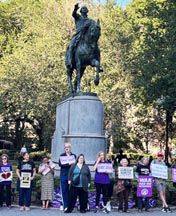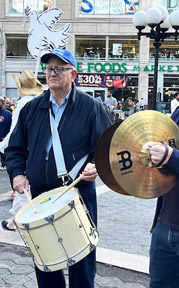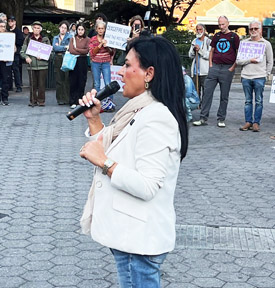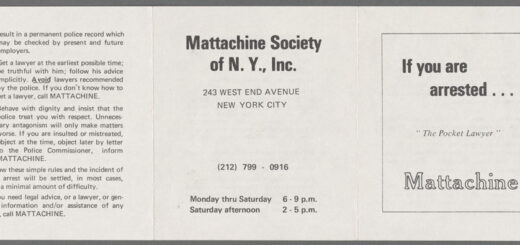Hopes for the Jewish New Year 5786: “The Possibility of Beginning Again”
Sunday was going to be a busy day, a pre-holiday marathon of Jewish political action from the NW Bronx to Union Square in Manhattan.
The Bronx leg didn’t go terribly well. While handing out literature for Zohran Mamdani with Jews for Religious and Economic Justice (JFREJ) and the Unity Democratic Club, a woman approached the table where I was sitting. She informed me, “You were probably raised in a Communist family.” She then asked me if I had ever been to Israel (Yes.). She told me there was no such thing as Palestine (Here we go.). She derisively expressed the view that I probably wasn’t observing the holidays or attending synagogue (Wrong again.). Finally, she declared that I should be ashamed of myself.
She shared that sentiment with others on the street who were listening to the exchange, while kindly suggesting she might want to move on. She related that she couldn’t step away because her beliefs were “too important.” Glaring at me, she said, “Globalize the Intifada means that they are coming to kill you!” It was a thought she punctuated by jabbing her finger directly at me.
Okay. What can you do? Unfortunately, she didn’t tap into my zen side when mentions of the deaths in Gaza went over her head. She was in a primitive mindset, a one-track train of thought. Unfortunately, rather than acknowledging her fears, I responded with my own form of rejection.
The afternoon was a different universe. Arriving in Manhattan, I wended my way through twenty blocks of people celebrating the Mexican Independence Day parade, carrying flags and wearing creative costumes. The vibe couldn’t have been more different than 235th Street. In Union Square Park, there was a profusion of activity. Couples, dogs, and individuals were enjoying the weather. There was the requisite lone person screaming something incomprehensibly.
I arrived early for the Israelis for Peace rally, co-organized with NYC Friends of Standing Together. People were making signs for the September 22 demonstration scheduled to take place in front of the French mission at 8:30 a.m. on Monday, to show solidarity with the French initiative to recognize the state of Palestine.
By 5 p.m., a significant number of people were on site, many of whom were familiar with the format and drill of the weekly vigils. Some were wearing the organization’s emblematic purple shirts. A drummer, a cymbals player, and a percussion shaker supplied the background soundtrack. There was a box with a stack of signs for people to hold. One had no text, only a broken heart. Others carried various messages such as “Not one more drop of blood” or “Netanyahu murders hostages.”
A special draw for the day was the presence of the co-founders of A Land For All, Rula Hardal and May Pundak. City Comptroller Brad Lander was also on hand.
Tamar Glezerman, Co-founder of Israelis for Peace, began by thanking everyone for attending. The Israeli-born activist said, “These last few weeks have been bleak beyond words.” She proceeded to read aloud from emails that she had exchanged with allies in Gaza, with whom she runs a direct aid program:
The situation is dire in the northern Gaza Strip. Internet and cell phone services have been cut off in large parts of these areas, and the IDF has reached the middle of the Sheikh Radwan neighborhood, very close to the Shati refugee camp and the Nasr neighborhood…An unprecedented media blackout is underway in the neighborhoods and regions of northern Gaza. Tons of shells are falling randomly, warplanes are firing continuously, buildings are being bombed over the heads of their residents, and finally, an evacuation order was issued for the Shuhada al-Shati and al-Sharqah government schools, which house thousands of displaced people, in preparation for their bombing…The internet is back after a two-day outage. The killing, bombing, and genocide haven’t stopped. The massacres continue hourly. Almost all shelters have been destroyed, and people are all in the streets. Since this morning, there hasn’t been a single drop of water to drink. The suffering is increasing, and I think death is inevitable. If there isn’t financial support, it’s okay because you did everything you could. Just pray for everyone. Keep us in your memories…At this moment, the remaining homes and shelters in Al-Shati camp are being bombed. Today is the day of greatest horror…This morning, we were trying to find food to feed some of the remaining families here, children, women, and men who haven’t eaten anything since yesterday. This man has spent his whole life in Al-Shati’ camp, and his profession is fishing. He is very skilled, according to what people here told me. He said, “You will eat fish today.” I asked him, “How?” He replied that he was going to the sea to try to catch some fish in his fishing net. We tried everything to stop him, but he refused and insisted on going despite all the danger surrounding us. One hour after he went to the sea, he was killed by Israeli naval bullets. He died trying to give people some hope that they would eat. There is no greater honor than that…A new massacre is taking place now in Al-Shati camp. So far, there are five martyrs, including children, who have been turned into pieces…Successive massacres are taking place north of Al-Shati’ camp. Ambulances cannot reach the wounded there. Thousands of people are trapped in and around Abu Asi School. Due to severe hunger and thirst, people, especially children, cannot escape on foot…Yes, my sister, Tamar. There are fainting cases everywhere due to hunger and thirst. There is bombing everywhere. There are dozens of injuries and martyrs. Thousands of people are besieged. The situation is very difficult.
It wasn’t easy listening to these words, which painted a dire picture of what was happening in real time.
When Lander took the microphone, he referenced the High Holidays and the call for “an accounting of the soul.” He also mentioned Aymeh Odeh’s recent visit to New York and the strong op-ed Odeh wrote for Haaretz in July 2025, when the Knesset attempted to expel him. Odeh had written, “Like Émile Zola, who cried out in defense of human conscience during the Dreyfus Affair, I too feel a moral duty to cry out.” Lander delivered excerpts, and he emphasized Odeh’s words, “Only together can we build something else: a different future. A better future.” It was the perfect segue into an introduction to the speakers from A Land For All.
Hardal spoke first. “Gaza is older than 4,000 years,” she said. “It has been destroyed.” She pointed to the messianic political vision of the current Israeli government. “Stop the war, the genocide, and the annexation of the West Bank.” In discussing how to make the recognition of a Palestinian state meaningful, Rula highlighted the need for “a shared future.” Beyond two states, she addressed the absolute need to “see reconciliation on the ground.”
Pundak picked up the thread when she delivered her thoughts. “Words are not enough these days. We need action. You are here right now, taking action. Being here together—this is resistance. [The] vision talks about separate and together. Thank you for not giving up. Our work is growing. For twenty-five years, we have all been complicit. What we are doing every day is choosing life.” Pundak didn’t shy away from calling out the Netanyahu regime, stating, “The clear vision of the Israeli government is akin to Sparta. If we don’t end the atrocities, there is no future.” Pundak’s final observations underscored, “In this moment of change, we have to fill the void with a solution that will work. We’re doing it. It starts with us.”
The final moments were silent, as activists held up photographs of murdered Palestinian children.
Clearly, it will be the people who can hold two narratives simultaneously that will lead the fight for change in the “Holy Land.” With Monday evening approaching, I wondered if I would hear anything from the pulpit of my Temple. I had been in touch with two of the rabbis I knew in a low-key way about my feelings.
The evening of services, our senior rabbi delivered a joke about someone who didn’t want to get out of bed and had the covers pulled over their head. Their mother informs them that they must get up because, in a matter of hours, they have to deliver a sermon.
The humor preceded her statement of realization that whatever she said, there would be those who would be unhappy. Yet, she had delivered an opening. American Jews were listening to her speak about “compassion and empathy, Hagar and Ishmael,” and “the possibility of beginning again.” Most importantly, in acknowledging the continuum of beliefs within the congregation, she candidly shared her fears. “Some of you will stop listening and decide that I’m no longer your rabbi,” she said.
Her words had special meaning for me because even though I engage with services every Friday night, I had been feeling extremely alienated from my Temple of decades. I wanted to see a rabbi from my synagogue addressing injustice at one of the many events that I attended.
Yes, I am one of her congregants who wants to separate the state of Israel from my Judaism, while working for equality in the land. But I feel heard now.
On Tuesday, I decided to do Tashlich.
Photos: Marcia G. Yerman







